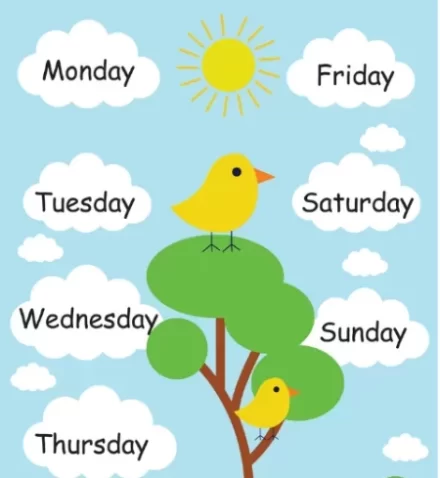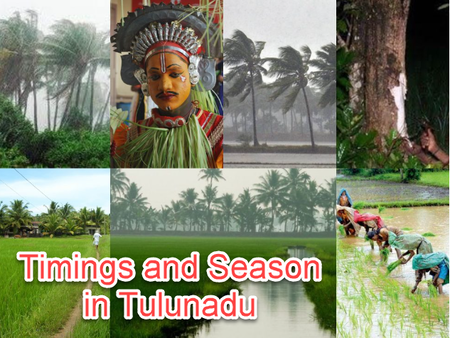Tulu Weekdays
Tulu Week Days – Vaarada Dinolu
Tulu Weekdays – Almost lost in the pages of history, Tulunadu had a calendar of its own, which was designed to complement the agrarian activities of the Tulu society. Bhakti V Hegde writes about the calendar, which now remains with handful of elderly at the rural areas. Remembering birthdays to marking things to do for the day, most of us are accustomed to the Julian Calendar’s 12 months of 30 or 31 days each. Any deviation from this calendar will make life a bit complicated and uneasy. However, probably it is the same convenience that must have made Julian Calendar prevail over Gregorian and several other calendars over the years.
It is fascinating to know that ages ago, the Tuluvas had developed their own calendar including Tulu Weekdays, which was used for daily use not just in the Taulava land but also in certain parts of Kerala. Owing to various reasons today this calendar has become a rare knowledge existing mainly among the elderly and the agriculturists in the rural areas.
The decline in usage of Tuluva calendar is obvious because today’s generation does not even know the names of the months of Tulu calender or Tulu Weekdays. A year is known as ‘Varsa’ or ‘Vorsa’ in Tulu language and the Tulu calendar is considered as one of the oldest solar Indian calendar. In this calendar, the new year or the first day of the Vorsa falls in ‘Paggu’ and the day is called ‘Bisu’ (April 14) and this day is celebrated with great pomp in the Tulunadu (Coastal Karnataka from Barkur to Kasargod) and Kerala.
The elaborate celebration of this festival on ‘Mesha Sankramana’ gives it the name ‘Bisu Parba,’ which means a festival as significant and important as ‘Deepavali’ itself. 12 months Like the Julian calendar, even Tulunadu calendar has 12 months
and the interesting names of the months for Tulu, Kannada, Tamil, Telugu, Sanskrit and Malayalam are given below. Malayalee’s follows little different month names compared to rest of the south Indian people and their year starts from Chingam month, which is from mid August as per English calender. For rest of the south Indians including Tulu and Sanskrit the year starts from Chaitra, which is from mid April.
Name of the Months in Tulu Kannada Tamil Malayalam Telugu and Sanskrit
| SL NO | TULU | KANNADA | TAMIL | MALAYALAM | TELUGU | SANSKRIT | ENGLISH |
|---|---|---|---|---|---|---|---|
| 1 | Paggu * | Chaitra * | Chittirai * | Medam | Chaithramu * | Caitraa * | Mid April - Mid May |
| 2 | Besha | Vaishaakha | Vaikaasi | Edavam | Vaisaakhamu | Vaisaakha | Mid May - Mid June |
| 3 | Kaarthel | JyeshTa | Aani | Midhunam | Jyeshtta | Jyestha | Mid June - Mid July |
| 4 | Aati | AashaaDha | Aadi | Karkidakam | Aashaadhamu | Aashaaḍha | Mid July - Mid August |
| 5 | Sona | Shraavana | Aavani | Chingam * | Sraavanamu | Shraavanaa | Mid August - Mid September |
| 6 | Nirnaala | Bhaadrapada | Purattaasi | Kanni | Bhaadhrapadamu | Bhaadrapada | Mid Sepetember - Mid October |
| 7 | Bontyolu | Aashwayuja | Aippasi | Thulam | Aasveeyujamu | Asveena | Mid October - Mid November |
| 8 | Jaarde | Kaarthika | Kaartikai | Vrischikam | Kaarthikamu | Kaarttika | Mid November - Mid December |
| 9 | Peraarde | Dhanur | Maargali | Dhanu | Maargaseershamu | Margaeersa | Mid December - Mid January |
| 10 | Ponny/Puyinthel | Pushya | Tai | Makaram | Pushyamu | Pauss/Taisya | Mid January - Mid February |
| 11 | Maayi | Maagha | Maasi | Kumbham | Maakhamu | Maagha | Mid February - Mid March |
| 12 | Suggi | Phaalguna | Panguni | Meenam | Phaalgunamu | Phaalguna | Mid March - Mid April |
| * Starting Month of the Year | |||||||
Each month has 30 to 31 days but the emphasis is laid on the full moon day and the new moon day. The entire Tulu calendar complements the agriculture activities, which had been the main occupation of the region.
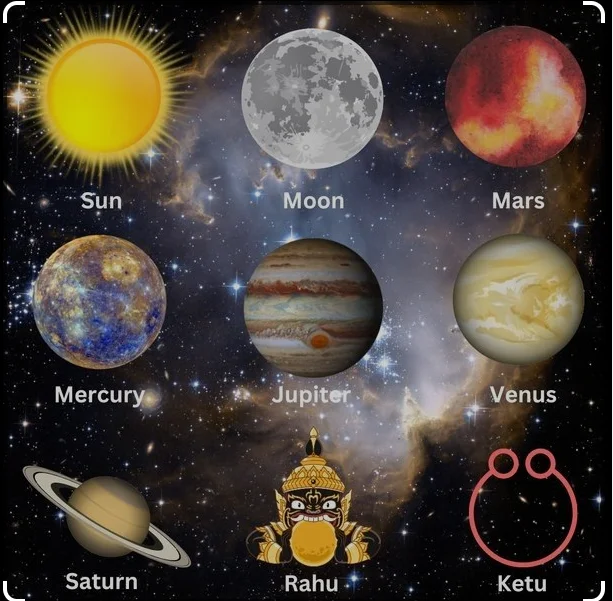
All agriculture activities and festivals, especially those pertaining to the Bhootas and the Daivas were planned and celebrated according to the ‘Amavase’ (new moon day) and ‘Hunnime’ (full moon day) and Sankranti in this calendrer. Unfortunately, breaking of the agrarian society and inclination towards Julian calendar led to the decline in usage of this calendar. Today at a very symbolic level, agriculture activities are planned in rural areas according to this calendar.
Folk enthusiast Deekaiah who has been on a crusade to popularize Tulu calendar has been bringing out printed Tulu calendar over the last 15 years. He says that one common thing among most indigenous calendars is that new year begins on April 14.“It is called by different names. May it be ‘Bisu’ or ‘Vishu’ or ‘Baisakhi’ or ‘Bihu’, all are celebrated on April 14,” he said adding that ‘Pathanaje’ in the month of Besha marks the end of all auspicious activities such as organizing of ‘Aata’ ‘Nema’ annual fairs of the temples etc.
Curtains fall on such activities and celebrations are re-started with ‘Parba’ or Deepavali. The day after every Sankranti is Singode and it is considered to be auspicious for Tuluvas. On Singode, the Tuluvas do not give out anything that stands for wealth and wellbeing. Though some organizations have been now organizing programs based on Tulu calendar, the acceptance of the calendar among masses has not yet happened. Most of the individuals and organizations working for the cause of Tulu say that the masses in general and youth in specific must be acquainted to the calendar before it fades out of the memory of Tuluvas.
Here are the Tulu Weekdays Kannada Weekdays and Rest of the Weekdays
Serial Number | English Days | Kannada Days | Tulu Days | Tamil Days | Malayalam Days | Telugu Days | Sanskrit Days | In Kannada Font |
1 | Sunday | Adityavaara | Aitaara | Nyayitru-kilamai | Njaayar/Njaayaraazhcha | Aadivaaramu | Ravivaasaraḥ | ಆದಿತ್ಯವಾರ/ಭಾನುವಾರ/ರವಿವಾರ |
2 | Monday | Soomavara | Soomaara | Tingat-kilamai | Thinkal/Thinkalaazhcha | Soamavaaramu | Somavaasaraḥ | ಸೋಮವಾರ |
3 | Tuesday | MangaLavara | Angarae/Manglaara | Chevvai-kilamai | Chovva/Chovvaazhcha | Mangalavaaramu | MaNgalavaasaraḥ | ಮಂಗಳವಾರ |
4 | Wednesday | Budhavaara | Budaara | Budhan-kilamai | Budhan/Budhanaazhcha | Budhavaaramu | Budhavaasaraḥ | ಬುಧವಾರ |
5 | Thursday | Guruvaara | Gurvaara | Vyala-kilamai | Vyaazham/Vyaazhaazhcha | Guruvaaramu | Guruvaasaraḥ | ಗುರುವಾರ |
6 | Friday | Shukravaara | Sukraara | Velli-kilamai | Velli/Velliyaazhcha | Sukravaaramu | Sukravaasaraḥ | ಶುಕ್ರವಾರ |
7 | Saturday | Shanivaara | Saniyaara | Sani-kilamai | Sani/Chani/Saniyaazhcha | Sanivaaramu | Sanivaasaraḥ | ಶನಿವಾರ |
Correspondence of the planets to the days of the week: basic
Tulu Weekdays vs Sanskrit Weekdays and its Planets
In Sanskrit, each day of the week has a name that indicates the connection of the day with one of the planets.
Monday is the day of the moon. In Sanskrit, the Moon is called Chandra or Soma, and Monday, respectively, Soma Vasara or Somavar.
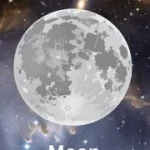
Tuesday is the day of Mars. Mars is called Kuja or Mangala and Tuesday is, therefore, Mangala Vasara or Mangalavar.

Wednesday is the day of Mercury (Saumya or Budha), so Wednesday is Buddha Vasara or Budhavar.

Thursday is the day of Jupiter (Guru or Brihaspati), so Thursday is Guru Vasara or Guruvar or Brihaspati Vasara or Brihaspativar.

Friday is the day of Venus (Bhrigu or Shukra), so Friday is Shukra Vasara or Shukravar.
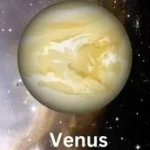
Saturday is the day of Saturn (Raviputra or Shani), so Saturday is Shani Vasara or Shanivar.
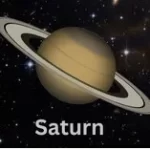
Sunday is the day of the Sun (Surya or Ravi), so Sunday is Ravi Vasara or Ravivar.

Tulu Weekdays vs Latin Weekdays
In other languages (mainly Romance), these parallels can also be traced.
In Latin, the days of the week were called as follows: Monday – Dies Lunae, Tuesday – Dies Martis (Martis – one of the names of Mars), Wednesday – Dies Mercurii, Thursday – Dies Iovis (Iovi – one of the names of Jupiter), Friday – Dies Veneris, Saturday – Dies Saturni, Sunday – Dies, Solis.
Since the Romance languages originated from Latin, these names (recognizable to varying degrees) can still be found in many languages of the Romance group.
Correspondence of the planets to the days of the week: the sequence of the planets
In classical treatises and modern books on Indian astrology, all the planets are in the same order: Sun, Moon, Mars, Mercury, Jupiter, Venus, and Saturn. Whatever was discussed, the author will consider the planets in this sequence.
If you look closely, you can see that this alternation is fully consistent with the order of the days of the week. The only difference is that the Sun is not at the end of the list, but at the beginning. And this is logical.
First, in many cultures, the week starts not on Monday, but Sunday. And secondly, the Sun is the centre of our universe, all the other planets revolve around it, so it rightfully takes first place among the planets and the days of the week.
The practical meaning of this information lies in the fact that when studying astrology, not mindlessly memorizing the sequence of planets, but understanding why astrologers list them this way and not otherwise (after all, you can list them by proximity to the Sun, by proximity to the Earth, by speed movement or other signs).
When analyzing a horoscope, it is very convenient to start with the Sun (especially since it is an indicator of a person’s personality, his qualities manifested externally), then move on to the Moon (an indicator of the soul and inner qualities), then to the rest of the planets.
o to Tulu News Page to read more about Tulu Nadu News, Events etc.
Go to Our Partner Website to book Self Drive Cars to drive in Mangalore, Udupi and Kasargod

